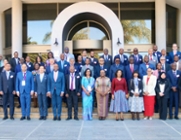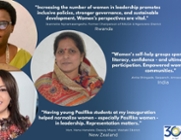CLGF Programme Manager, Claire Frost, talks about her experiences at the Policy Forum for Development and why this is such an important forum.
As others in our network prepared to head off to New York for the United Nations (UN) General Assembly, I found myself heading in the opposite direction, boarding a plane for Kathmandu and the Asia edition of the Policy Forum for Development. The PFD came into being in 2013 following a series of structured dialogues between civil society, local government and the European Union. The Forum, which meets twice a year, once in Brussels and once in one of the world regions, is a space for multi-stakeholder dialogue, facilitating exchange and consultation between the constituencies, as well as an entry point to better understand and contribute to EU development policies and programmes.
Holistic vision
CLGF has been on the PFD Task Team since 2017 and since that time I have had the pleasure of being CLGF’s representative. As I got on my plane, I was looking forward to seeing colleagues and partners; to discussing issues of importance to all of our constituencies, such as enabling environment and the shrinking space for public actors; and to better understand the holistic vision of the EU for the Asia region.
The meeting opened on the same day as the Global Taskforce for Local and Regional Governments (GTF) held the Local and Regional Governments Forum to coincide with the UN Sustainable Development Goals (SDGs) Summit: Connecting global ambition and local action. To me this was a strong demonstration of how our global voice has grown and developed over the period since the adoption of the SDGs in 2015; and that, while we were telling our story about the important work local government is doing on the ground to meet these development objectives, we were able to, in parallel, look more deeply at the progress made in Asia and reflect and exchange with key partners so as to further reinforce our efforts.
Risk of extreme poverty
The Asia region still faces systemic issues in the advancement of the SDGs. Despite progress against income-based measures of poverty, inequalities are deepening both within and between countries in the region. Many people remain vulnerable and at risk of falling back into extreme poverty, civil society advocates continue to face violence and, in some countries, state sanctioned persecution; and local governments often lack the capacity and financial means to provide basic services to citizens. Within this context we came together to share good practice and learn from each other on how we can work better together and where there are opportunities for the EU to support us in this important work.
Impacts and potential joint action
One of the best sessions at this PFD was on Climate. Tackling climate crisis: advancing environmental justice allowed the PFD to do what it does best, provide a thematic framework around which the very different member organisations could make inputs from their constituencies which highlighted the interconnectedness of impacts and the potential for joint action. David Molden, Director General of the International Centre for Integrated Mountain Development was especially good, using the example of mountain people to illustrate the interconnectedness of different factors of marginalisation, but also stressing the climate crisis as a potentially unifying challenge. This was especially the case in the context of remote peoples, where conflict has been more common than cooperation, and climate change, through the sheer monumental crisis being provoked, was bringing traditional enemies together to look for solutions and strategies of mitigation.
Real strength of the PFD
At its core, for me, this is the real strength of the PFD, bringing together local government, the private sector, cooperatives, trade unions, NGOs, CSOs with EU institutions. It’s a space which allows us to step outside of our sectors, to better understand the challenges being faced by other actors in development and to build trust between our constituencies to work in a more joined up way. We all talk about Multi-stakeholder partnerships as the only way we will achieve the goals of Agenda 2030, we must reinforce each other and to build the linkages which will lead to stronger multi-stakeholder partnerships for development. And the PFD is a real space of exchange to allow that to happen.





